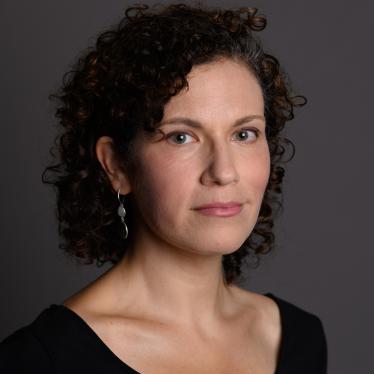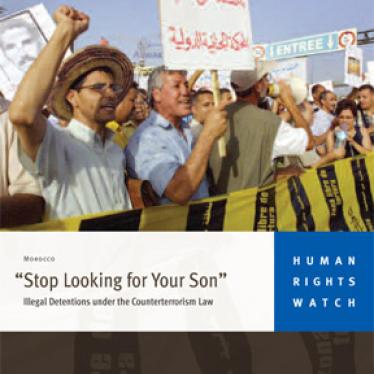(Washington) - Morocco might look like the exception to the rule of either revolution or violent repression among Arab nations these days.
Friday the country held a referendum on a large package of constitutional reforms that King Mohammed VI announced on June 17, apparently in response to the February 20 Movement for Change, a youth-led protest group inspired by the uprisings in Egypt and Tunisia.
But while there are opportunities for genuine change in Morocco, don't give the king too much credit yet. My conversations recently with many Moroccans in Rabat and Casablanca suggest that there's a gulf between the government's official discourse and the way it treats its citizens.
Protesters told me that security forces have repeatedly attacked demonstrators viciously with clubs without warning. In some cases, guards chased them down the streets to beat them, long after the protest was dispersed.
Hamza, a 25-year-old student of journalism and philosophy, who takes pride in having written the slogans for the February 20 movement, told me security forces beat him so hard that several weeks later he still has daily fainting spells. Girls participating in the protests said police hit them between the legs, and called them "bitches" who belonged at home.
Kamal Amari, one protester in the city of Safi, died in a hospital four days after he was beaten. The government claims he did not die from his injuries, but the prosecutor general has yet to release the full autopsy results to his family.
The accounts I heard in Rabat and Casablanca described the same pattern of violence by various security forces at a series of protests, most in May, suggesting a policy decision to respond this way. When I observed one protest in Rabat a couple of weeks ago, it was easy to pick out the plain-clothes police agents hovering around, photographing protesters and me.
It's hard for protesters to believe that the king's proposed reforms are genuine when they're being beaten on the streets. And while the king claims the reform process included consultation with youths, in fact, the constitutional changes were drafted by his hand-picked committee, mostly behind closed doors.
Even the text wasn't made public until mid-June. Moroccans have only had a couple of weeks to discuss nearly 80 additions to the constitution before voting on them - hardly a participatory, deliberative process. Polls indicate that the number of people boycotting the referendum (including the February 20 movement) may be substantial.
The proposed constitutional changes do include some noteworthy provisions on human rights and the separation of powers. They make international human rights treaties that Morocco has ratified supreme within Moroccan law, criminalize torture and arbitrary detention, and guarantee fair trial rights and freedom of expression.
Other provisions strengthen judicial independence, grant the prime minister more executive powers and give the Amazigh (Berber) population's Tamazight language official status.
But the changes also protect many of the king's prerogatives, such as the power to dissolve parliament at will.
More important, it's far from clear whether the proposed changes to the constitution, if approved, will alter the everyday functioning of the state.
Morocco's constitution already provides, for example, for freedom of expression and opinion, but that hasn't kept the government from arbitrarily imprisoning critics, including journalists, who have criticized the government. Nor has it kept the government from simply denying accreditation to foreign journalists whose reporting displeased them - Al Jazeera TV was forced to shut its operations down last year after Morocco denied accreditation to seven journalists.
Rachid Nini, a popular editor who had written about alleged corruption and human rights abuses by senior government officials, was recently sentenced to a year in prison for "reporting on untrue criminal offenses."
The Moroccan constitution also already provides for freedom of association, and Moroccan law states that to operate legally organizations need only register with local authorities. Yet local Interior Ministry representatives often refuse to accept registration papers when the government is unhappy with a group's objectives or membership, as Human Rights Watch documented in a 2009 report.
Even though the constitution already barred arbitrary arrest, and local laws provided for due process rights, violations of such rights are frequent, with courts routinely ignoring requests for medical examinations from defendants who claim to have been tortured, refusing to summon exculpatory witnesses, and convicting defendants on the basis of apparently coerced confessions. The government recently held three non-violent activists seeking independence for the Western Sahara in pretrial detention for 18 months, on charges of "harming internal security," with little evidence against them.
It is no surprise that while some of the protesters who were beaten filed complaints about police brutality, nobody I interviewed could point to a single case that the state prosecutor had moved forward.
In a country where the interests of those in power have usually weighed more than the law, it's easy to understand the protestors' cynicism about the changes to the text of the constitution or other laws.
To many outside Morocco, what's happening there looks pretty good: after all, this is not Syria, Libya, or Bahrain. Security forces aren't slaughtering protesters. The opposition hasn't been rounded up and imprisoned. And the king has proposed some necessary changes.
But according to many of the young Moroccans who have been pushing for change - with simple slogans like "freedom," "justice," and "democracy" - since February, unconditional praise for the king's reform proposals would amount to a betrayal of their values, to settling for less because of the neighborhood their country is in.
Ultimately, the real test of Morocco's reform will be whether ordinary Moroccans can speak out without fear and participate in decisions that affect them, and whether they can count on their institutions of justice to operate independently and hold accountable those who use violence against Morocco's people.
Maria McFarland is deputy Washington director at Human Rights Watch.









